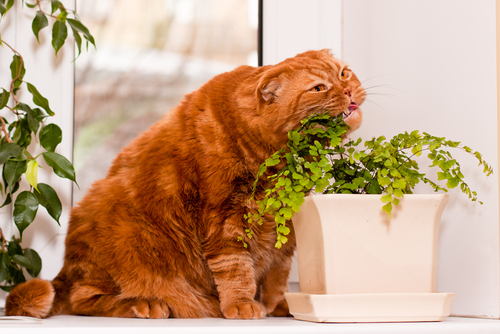Discover the Cat Treat Your Feline Friend Is Sure to Love

Pets are like one of the family. We care for them, love them and spoil them unconditionally. Sometimes, however, it seems like it’s much easier to buy presents for a dog than for a cat. It doesn’t take much to make your dog happy: just taking them out for a walk or throwing them some scraps from dinner is enough to set their tails wagging like crazy. Cats, on the other hand, are a different story. So today, we’re going to tell you all about catnip, a cat treat your feline friend is sure to love.
They might be harder to find than dog treats, but there are certain things your cat will go absolutely crazy for. They might not express their joy quite as energetically as our canine friends, but there is a certain plant that your cat is almost certain to love: catnip. In this article, we’ll tell you all about it.
Catnip – a very special cat treat

Catnip, whose scientific name is Nepeta Cataria, is also known as catmint. Many companies have altered it, commercializing it to create an irresistible cat treat.
Despite its name and its physical appearance, catmint isn’t actually related to the mint, or even the basil family. In fact, it’s actually more closely related to plants such as lavender and thyme. This perennial plant has coarse-toothed leaves, and pretty, yellow flowers. It normally grows in dry climates.
If a cat ever comes across one of these plants, it will start to chew on its leaves, without actually eating it. Maybe it’s the faint scent of mint that attracts its attention, or maybe it’s something else. Whatever attracts the attention of our feline friends, it’s hard to miss its unusual effects.
Catnip – how does it affect cats
When they first ingest the catnip, you might notice your cat becoming more playful than usual, like dogs do when you give them a treat. But if they continue eating it, their behavior can become a little strange!
They might start to crawl or roll around on the floor, become more nervous or jumpy than usual, or start play-hunting and pouncing on random things around your house. It’s as if all their senses have been heightened. This behavior can go on for half an hour or more, without them even ingesting any more catnip. You could say that this cat treat is almost like the feline version of a legal drug.
This is the reaction you’ll usually get, but some cats react completely differently. Some become more relaxed, while others stare vacantly into space and make weird noises.
Why does catnip affect cats?
One explanation for this reaction has to do with the main component of this plant: nepetalactone. Its chemical composition is actually very similar to female cats’ urine, and this might be what attracts its attention.
Another reason might be that catnip closely resembles feline sex pheromones, which is why female cats often react more strongly to catnip than males. Bizarrely, even castrated cats are attracted to this natural treat.
The positive effects catnip has on cats are well-known to pet toy companies, who incorporate it into toys, beds and other items.
It can also be a really useful tool for training your cat, whether it be to teach it to sleep in its own bed, use the litter box, or use a scratching post instead of your furniture. It’s the perfect cat treat if you like to use positive reinforcement.
Does this cat treat have any negative effects?

Yes, it does. They say that moderation is the key, and this is definitely the case when it comes to catnip. You can give it to them as an occasional treat, but eating excessive amounts could make them feel sick and even cause stomach pains.
It can also cause them to become overexcited, and they can even become aggressive if they’ve eaten too much.
However, as long as you don’t give them too much, you won’t find a better natural treat for your cat than catnip. While it can make them go completely crazy, its unique properties will also make them feel happy and relaxed. So, what are you waiting for? Whether natural or commercial catnip, your cat will love this amazing treat.
Pets are like one of the family. We care for them, love them and spoil them unconditionally. Sometimes, however, it seems like it’s much easier to buy presents for a dog than for a cat. It doesn’t take much to make your dog happy: just taking them out for a walk or throwing them some scraps from dinner is enough to set their tails wagging like crazy. Cats, on the other hand, are a different story. So today, we’re going to tell you all about catnip, a cat treat your feline friend is sure to love.
They might be harder to find than dog treats, but there are certain things your cat will go absolutely crazy for. They might not express their joy quite as energetically as our canine friends, but there is a certain plant that your cat is almost certain to love: catnip. In this article, we’ll tell you all about it.
Catnip – a very special cat treat

Catnip, whose scientific name is Nepeta Cataria, is also known as catmint. Many companies have altered it, commercializing it to create an irresistible cat treat.
Despite its name and its physical appearance, catmint isn’t actually related to the mint, or even the basil family. In fact, it’s actually more closely related to plants such as lavender and thyme. This perennial plant has coarse-toothed leaves, and pretty, yellow flowers. It normally grows in dry climates.
If a cat ever comes across one of these plants, it will start to chew on its leaves, without actually eating it. Maybe it’s the faint scent of mint that attracts its attention, or maybe it’s something else. Whatever attracts the attention of our feline friends, it’s hard to miss its unusual effects.
Catnip – how does it affect cats
When they first ingest the catnip, you might notice your cat becoming more playful than usual, like dogs do when you give them a treat. But if they continue eating it, their behavior can become a little strange!
They might start to crawl or roll around on the floor, become more nervous or jumpy than usual, or start play-hunting and pouncing on random things around your house. It’s as if all their senses have been heightened. This behavior can go on for half an hour or more, without them even ingesting any more catnip. You could say that this cat treat is almost like the feline version of a legal drug.
This is the reaction you’ll usually get, but some cats react completely differently. Some become more relaxed, while others stare vacantly into space and make weird noises.
Why does catnip affect cats?
One explanation for this reaction has to do with the main component of this plant: nepetalactone. Its chemical composition is actually very similar to female cats’ urine, and this might be what attracts its attention.
Another reason might be that catnip closely resembles feline sex pheromones, which is why female cats often react more strongly to catnip than males. Bizarrely, even castrated cats are attracted to this natural treat.
The positive effects catnip has on cats are well-known to pet toy companies, who incorporate it into toys, beds and other items.
It can also be a really useful tool for training your cat, whether it be to teach it to sleep in its own bed, use the litter box, or use a scratching post instead of your furniture. It’s the perfect cat treat if you like to use positive reinforcement.
Does this cat treat have any negative effects?

Yes, it does. They say that moderation is the key, and this is definitely the case when it comes to catnip. You can give it to them as an occasional treat, but eating excessive amounts could make them feel sick and even cause stomach pains.
It can also cause them to become overexcited, and they can even become aggressive if they’ve eaten too much.
However, as long as you don’t give them too much, you won’t find a better natural treat for your cat than catnip. While it can make them go completely crazy, its unique properties will also make them feel happy and relaxed. So, what are you waiting for? Whether natural or commercial catnip, your cat will love this amazing treat.
This text is provided for informational purposes only and does not replace consultation with a professional. If in doubt, consult your specialist.








